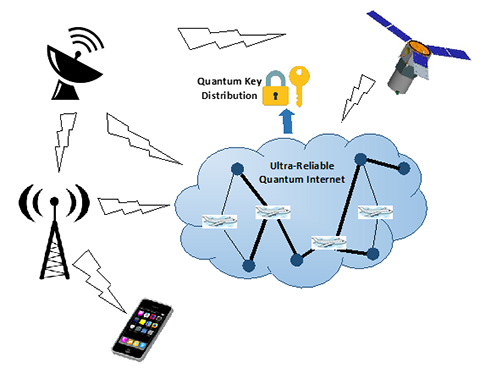
Contributed by Lajos Hanzo based on the SPS webinar by the same title, When Quantum Signal Processing and Communications Meet, available on the SPS Resource Center.
THE QUANTUM RACE...
The marriage of ever-more sophisticated signal processing and wireless communications has led to compelling “tele-presence” solutions - at the touch of a dialing key.
However, the “quantum” leaps both in digital signal processing theory and in its nano-scale-based implementation are set to depart from classical physics obeying the well-understood laws revealed by classical science. This is because the advances in semiconductor technology have led to nano-scale integration densities. As a result, we either have to accept that ever-larger chips have to be developed for accommodating the sophisticated signal processing algorithms of next-generation consumer electronics or we have to tolerate and mitigate the emerging quantum effects.
QUANTUM KEY DISTRIBUTION
In recent years, substantial progress has been made both in quantum computing and quantum communications. There are numerous operational quantum communications networks in Canada, China, Europe, and the United States, just to mention a few of these advanced high-security systems. China has successfully completed the Micious experiment and demonstrated secure quantum key distribution (QKD) over a distance of 1200 km using a satellite and there is also a fiber-based China-Austria QKD link. However, the ambitious research objective of the community is to make the vision of unbreakable global quantum communications portrayed at a glance in the following illustration a reality.

The QKD protocol is a secret key negotiation technique, which is potentially compatible with the existing security solutions, once the secret key has been agreed. Hence, it could find its way into existing secure networks. However, as all technical solutions, it has to obey certain tradeoffs and requires both a quantum as well as a classical channel. Furthermore, in classical secure networks the secret key has to be at least as long as the message, which imposes undesired limitations both on the classical and on the family of quantum networks.
QUANTUM SEARCH ALGORITHMS
The formidable computing power of quantum-search algorithms (QSAs) - conceived by the computer-science-oriented quantum community may be beneficially exploited for solving numerous large-scale search problems found in wireless communications. For example, large-scale multi-user detection problems were solved at the base-station (BS), where all K users supported in the mobile-to-BS uplink were simultaneously detected by using as few as square-root-K cost-function evaluations. This search problem becomes extremely challenging for a large number of users, especially, when the system relies on high-throughput multi-level modulation schemes, as required by next-generation systems. An even more grave challenge is, when the BSs are interlinked by optical fiber and after exchanging their received information make a joint decision about all the users' information in all cells.
Further cutting-edge solutions were conceived for other large-scale search problems, such as joint data and channel estimation and for transmit preprocessing in support of multi-user transmission, where the knowledge of the downlink channel is exploited for eliminating the potential interuser interference that would be encountered in the hostile dispersive downlink channel. As a benefit, the mobile user would receive clean, flawless signals and hence low-complexity single-user reception can be invoked.
QUANTUM CODING
Given the vulnerable nature of quantum circuits, the tiniest of environmental interference perturbs their quantum state, which is hence collapsed back into the classic world and all benefits of parallel processing in the quantum domain evaporate. In this context, quantum error corrections codes may be used for correcting both the bit-flips and phase-flips inflicted by the quantum decoherence. Further advances in quantum codes are vital for improving the performance of all quantum circuits and quantum computers.
Other media:
Listen to the IEEE Quantum Podcast “Episode 5: A Conversation with Lajos Hanzo”:
https://quantum.ieee.org/podcasts
Additional information, references, and video, please visit:
https://www-mobile.ecs.soton.ac.uk/res/int/quantum
References:
N. Hosseinidehaj, Z. Babar, R. Malaney, S. X. Ng, and L. Hanzo, "Satellite-based continuous-variable quantum communications: State-of-the-art and a predictive outlook," IEEE Communications Surveys & Tutorials, vol. 21, no. 1, pp. 881-919, First quarter 2019, doi: https://doi.org/10.1109/COMST.2018.2864557.
P. Botsinis et al., "Quantum Search Algorithms for Wireless Communications," IEEE Communications Surveys & Tutorials, vol. 21, no. 2, pp. 1209-1242, Second quarter 2019, doi: 10.1109/COMST.2018.2882385.
Z. Babar , D. Chandra, H. V. Nguyen, P. Botsinis, D. Alanis, S. X. Ng, and L. Hanzo, "Duality of Quantum and Classical Error Correction Codes: Design Principles and Examples," IEEE Communications Surveys & Tutorials, vol. 21, no. 1, pp. 970-1010, First quarter 2019, doi: 10.1109/COMST.2018.2861361.
